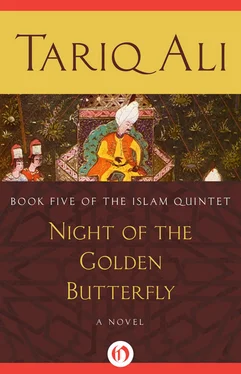‘Listen, kind sir. You explain it to the lady. I can’t allow her to publish the interview. I know I agreed, but in America they loved me. Look, dear sir, I’m just a village girl. I only went to school for five years. Captain Lateef was a distant relation. My father gave me to him because he didn’t want a dowry. I just want her, he told my father. Never treated me well. He gets home from the office and drags me to bed. “Open your legs, girl. Hurry up.” Then he mounts me like a dog, and after his business is finished he goes and bathes and says his afternoon prayers. That was life with him for ten years. Two children I gave birth to, and then a kind lady said to me it’s better get your tubes tied. Or this man will just make you a machine to produce sons.’
I asked who the lady was, and Naughty’s hitherto untroubled face became clouded with anxiety. ‘Such a kind lady. She suggested I learn some English and helped me do it. I’m filled with shame. She was General Rafiq’s wife. He first saw me when I was having English lessons with Begum Neelam. One day he sent his car for me. I thought the car would take me to Begum Neelam. It took me to a small hotel in Isloo. General Sahib was waiting for me. He talked a lot, asked many questions and then touched my breasts and said they were nice. So I opened my legs for him. Lateef knew. He said, “Open your legs for the general, you prostitute. It’s good for me.”’
I asked whether her legs had been opened for other generals and if so, how many.
‘Three, including the big chief, but Rafiq, may he be safe in heaven, was the only general who talked to me. Asked afterwards how I felt. What gave me real pleasure. Rafiq was really a very kind man. The other generals made me betray him. Once I betrayed him, my life was finished. What could I do? That’s when I met the Frenchman.’
Once again I interrupted her and asked with as much delicacy as I could muster whether the Frenchman, too, had asked her to open her legs. Her response was accompanied by raucous laughter.
‘No, no, sir. He liked boys. He worked hard on their bums. But he was very kind to me. His name was Gibril, like the angel. Please, sir, please ask the lady and the French monsieur to forget the interview. If it is published, my life will be finished.’
‘Have you told anyone about this interview?’
‘Only my American publicist, Mr Jonathan. He said if the interview was made a book it would be the end of my career. He was very angry. Then I said there was no contract. I had not signed anything. Then he became happy. He wants me to go to Israel, where my book will be published in six months. Sir, is it good idea?’
‘Very bad idea. Listen to me carefully, Naughty. Don’t demand anything of the French publisher now. Tell them you’ll think about it and decide in a few months’ time.’
She agreed. She had sent Lateef a great deal of money for their two sons and had been invited back for a family get-together later in the month, but it was to be a private visit. No publicity at all. Before we rejoined the others I couldn’t resist one last question.
‘I saw a photograph of you in New York. Did anyone in the photograph ask you to open your legs?’
‘The French television guy tried again. I said no. The bald writer pursued me like an animal. I finally agreed but his tablets didn’t work. He made all sorts of promises to get his way. He would review my book in the New York Book Review and New Yorker Book Review and many other things.’
Back in the kitchen, Naughty did as I had suggested and feigned indecision. The rest of the evening passed peacefully, except for the constant ringing of her cell phone. Finally she said her publicist was waiting in a wine bar for her with other people. She left.
Zaynab was now thoroughly disillusioned. ‘Your conversation with her is on tape. Henri suggested we tape everything.’
I was astonished and reprimanded them.
‘I do understand a lot of Punjabi’, Zaynab volunteered, ‘but what language were you speaking? Most of it was incomprehensible.’
Ordinary people measure satisfaction in a variety of ways. A chef who knows he forgot to include some key ingredients in the dish he has just served will not be pleased with the result, regardless of the plaudits received from every customer. A writer may be delighted with her own work, regardless of anything the critics might say. For celebrities there is only one measure. The amount of exposure they receive in any given week in the media, the number of paparazzi skulking in hidden places hoping for an unusual photograph, all this feeds the insatiable desire for publicity that has become, for so many, the transplanted heart of an empty world.
Celebdom is the summit of ambition today and is pursued at whatever cost. It’s a world peopled by actors and sportsmen and a few writers and certain politicians who are devoid of any principle except an insensate obsession with multiplying their wealth and fame. Their marketing and publicity advisers work overtime to ensure that our leaders get enough exposure on celebrity talk shows or in the company of other suitable celebs. The appeal of reality television lies in its insistence that anyone can become A-list overnight. Fellini’s brilliant parody of the jet-setter’s world in La Dolce Vita has been superseded, but in ways that would not have surprised him in the least.
Naughty’s example was a single case in point. Who can blame her for being seduced by the glitter and the cash, when others a hundred times more intelligent and already multimillionaires in their own right were just as desperate to be known to a larger world? This, I suggested to Henri, was the book he should really be commissioning, with the interview as an appendix published in the public interest.
Henri waged guerrilla war against the spirit of the age. He had published stinging essays on the political culture of his own country, some of them written by him. Now he agreed that this was the best way to publish the book, as a combination of polemic and oral history. Both parts should be exactly the same length to emphasize their interdependence, and which came first could be decided later. Zaynab was not convinced. The interview had to be the heart of the book, and the rest an introduction or an epilogue. There was no changing her mind on this structure. She won the argument. It had turned out to be a convivial and productive evening after all.
Once we were alone, Zaynab’s customary curiosity took charge. She wanted every detail of the Richmond conversations. To her annoyance I would provide only a bare summary. But Neelam’s role in the saga of Naughty’s rise surprised both of us, and confirmed my impression of her as a warm-hearted and intelligent person, not unlike her mother.
Zaynab had begun to miss Fatherland. The memory of Plato had become blended with all the other events in her life. She wanted to see how he had left the painting that she had seen in its early stages and disliked. She had found and kept a scrap of Plato’s writing, a diary entry or memo. It was unheard of for Plato to write, so this must have been about something he wanted to paint at some stage.
Weak Smile: A short talk with I. M. Malik, March 2001.
Malik came with paintings because I refused to go to his neat, tidy studio that I’ve always hated. There we used to crowd into the middle of the room, and he would light the place with five huge spotlights and display his paintings. Most of them were examples of bad landscape art: mountain streams with a deer watching from above, pine trees and hills with monkeys, portraits of the famous and the rich and copies of countless other paintings that already existed. I stopped going and when he rang I asked him to bring his new wares to my place. He wanted an honest opinion. Malik was an intelligent critic and I always wondered how someone like him who understood other people’s work extremely well had so few insights into his own art. His admirers, and there were many, claimed that his finest work had been done in pre-Partition Lahore in the 1940s, when the city was known as the Paris of the East and intellectual and artistic life had peaked. What use was all that now?
Читать дальше












